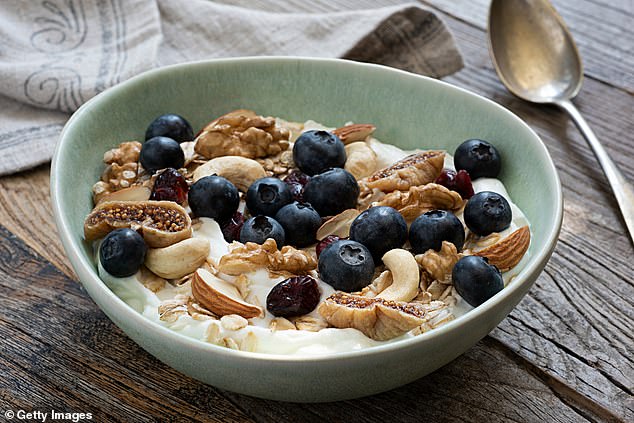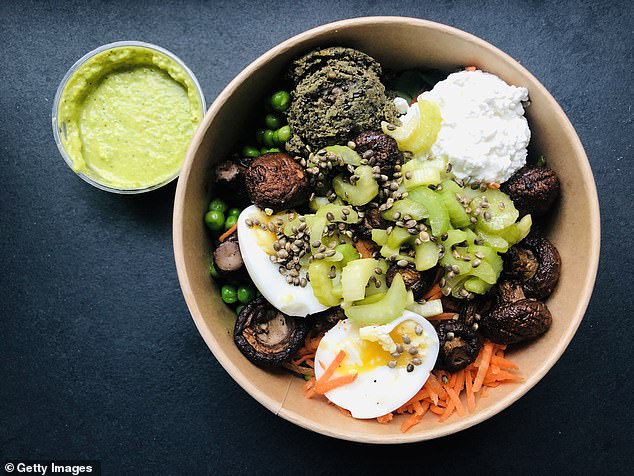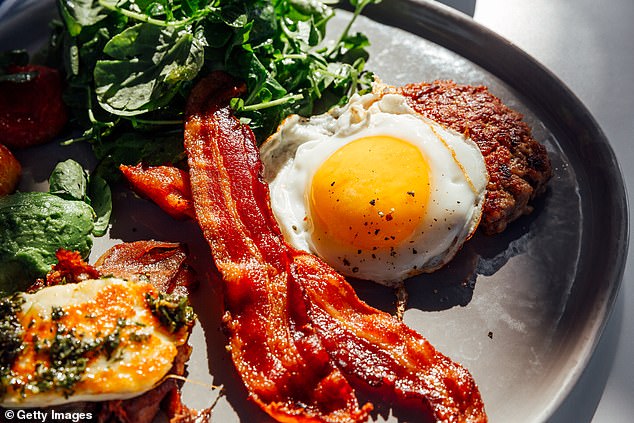One of the things that worries me about age is becoming weaker and less mobile.
It is known that after the age of 30, unless you do something about it, you lose up to 5 percent of your muscle mass for each decade that passes. This means you can’t do as much, but over time, parts of you start to sag, wobble, and bulge.
That’s why I do resistance exercises every morning, like push-ups and squats, which work the largest muscles in the body, the thighs and upper body. Even though they are never easier or more fun, I stick with them because I know they are very important if I want to enjoy a healthy old age.
In addition to doing resistance exercises, I also make sure to consume plenty of protein. This is because it is essential to keep muscles and bones in good shape.
I like to start the day with eggs, writes Dr. Michael Mosley. Whether you prefer them boiled, scrambled, or fried, a couple of eggs add about 14g of protein.
And by ‘enough’ I mean almost double what the NHS recommends for adults aged 19 and over.
This is because more and more research shows that the guidelines (45 g of protein per day for women, 55 g of protein for men) are too low for optimal health, especially after age 60.
For example, in a recent study published in the Journal of Cachexia, Sarcopenia and Muscle, researchers from Taiwan found that increasing protein intake to much higher levels not only leads to slimmer waists and greater strength, but also to a reduction significant levels of unhealthy fats in the blood.
In the study, 98 people, most of them women and all in their 60s, were asked to add a daily soup containing 30 g of protein to their diet or continue as normal.
What I found interesting about this research is that at the beginning the volunteers were already eating above the NHS recommended protein levels.
Adding the protein-rich soup increased average levels from about 60 g to about 90 g per day.
In addition to consuming more protein, the soup drinkers were also asked to do about nine minutes of resistance exercise daily and follow this new regimen for three months.
At the end of the study, the soup group had not only lost more fat around the waist (about 2 cm), but also experienced greater improvements in grip strength, walking speed, and triglyceride levels. (Like “bad” cholesterol, triglycerides build up in blood vessels and are linked to heart attacks and strokes.)
Protein helps you lose weight because it keeps you fuller longer, and when you eat more protein you tend to eat fewer carbohydrates, and this improves blood fats (carbohydrates drive their increase).
This is consistent with the results of another study, published in 2005 in the Journal of Nutrition, where 48 women, all in their 40s, were asked to eat the recommended levels of about 50 g of protein per day or a diet containing the double those levels. .
They were also asked to follow an exercise program in which they walked briskly three days a week and did resistance exercises two days. At the end of four months, the high-protein diet group had lost 1.4 (8.8 kg) of body fat, 7.3 pounds (3.3 kg) more than those on the low-protein diet .

Greek yogurt is also a good way to increase protein levels, especially if you add nuts. A small serving (200 g) with nuts will provide around 25 g of protein.
What matters is not just the amount, but when you eat the protein; It is better to spread your intake throughout the day, rather than eating it all in one meal.
That was the conclusion of a study conducted by the University of Texas in 2014. Volunteers were asked to spend two weeks eating meals containing 10 g of protein for breakfast, 20 g of protein for lunch, and 60 g of protein for lunch. dinner, which is pretty typical. of how most of us eat.
Then, for another two weeks, each meal (breakfast, lunch, and dinner) contained 30 g of protein.
Before and after the experiment, they bravely agreed to have muscle biopsies taken. It turned out that when volunteers consumed equal amounts of protein at each meal, they produced more muscle than when they consumed protein more unevenly.
So how can you incorporate more healthy proteins into your diet?
I like to start the day with eggs. Whether you prefer them boiled, scrambled, or fried, a couple of eggs add about 14g of protein. If you add smoked salmon or a couple of rashers of bacon, you will get up to 30 g.
Or you can opt for smoked herring for breakfast. A small herring, about 100 g, will provide you with 25 g of protein.

A growing body of research shows that the guidelines are too low for optimal health, especially after age 60.
Greek yogurt is also a good way to increase protein levels, especially if you add nuts. A small serving (200 g) with nuts will provide around 25 g of protein.
For lunch or dinner, the best option to increase protein is meat or fish, and a palm-sized piece of either provides about 30g of protein.
If you’re vegetarian, beans and lentils are a protein-rich option. One cup (200 g) of cooked lentils provides about 20 g of protein. And tofu, which is an excellent meat substitute, provides approximately 18 g of protein per 150 g.
If you’re struggling to get enough protein in your diet, you may want to supplement with protein bars and drinks.

Anthropologists say that in the past singing around the fire would have played an important role in uniting the group.
Although I am not good at singing, I like to sing a melody. And I’m not alone.
There is something special about singing, as it is common to all cultures and has been practiced for tens of thousands of years (oddly enough, our brains contain many of the same genes found in songbirds).
Anthropologists tell me that in the past singing around the fire would have played an important role in group bonding, a way of expressing emotions that unites us.
Singing also plays an important role in restoring the damaged brain. Now, researchers at the University of Helsinki say they have discovered why singing helps stroke patients regain the power of speech.
Previously, this team had shown that patients with stroke and aphasia (a reduced ability to understand or produce speech) made better progress after four months of singing therapy than with standard care; Singing also made those patients (and their caregivers) feel less socially isolated.
In the latest study, researchers in Helsinki took brain scans of aphasia patients who had suffered a stroke and showed that after four months, those who had received singing therapy (in the form of a weekly group session and singing at home three times a week) developed new brain cells. in areas linked to language and speech. And as these areas recovered, so did his ability to speak.
I like the idea of growing new brain cells, so despite occasional protests from my wife and family, I plan to continue singing songs, even if it’s without melody.
A few weeks ago there were reports that a form of intermittent fasting, known as time-restricted eating (where you limit the times you eat), could be bad for your heart.
However, as I noted in this column, the study that generated the negative headlines has not yet been published and was flawed.
That’s why I was pleased to see the results of a recent study, published in the Journal of the Medical Heart Association, showing that eating on a restricted schedule can be good for your heart.
A group of 48 middle-aged people who had recently suffered a heart attack were asked to continue their normal diet or try a form of time-restricted eating called 16:8: fasting each day for 16 hours and then eating within a limited period of time. eight hour window.
After six months, the fasting group experienced greater improvements in their blood pressure and their hearts also functioned better than the control group.
What advice are your children most receptive to? Researchers at the University of Illinois Urbana-Champaign recorded the advice parents gave to their children about to start high school. When they followed this up later, they discovered that the most helpful advice (from a child’s perspective) was to treat new experiences, even bad ones, as learning opportunities. The good news is that even the young people who seemed unreceptive tried to put their parents’ advice into practice.

